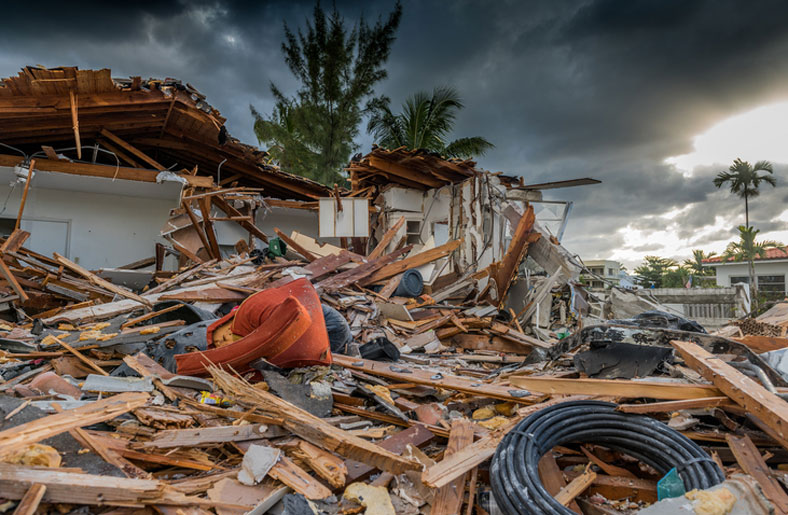Written by Jack Levinson

No matter where you live, no matter who you are, emergency situations are always subject to arise unexpectedly. During times of crisis, it’s a great relief to look to professionals to provide support, structure, and clarity on how to move forward. Stepping up in such situations is no easy feat, and it’s not something just anyone can do. Rather, it requires extensive training and no shortage of skill to take responsibility for those in urgent need, as you will be entrusted with the authority to act in high-risk situations.
When we think of disaster relief workers, we tend to think of firefighters, FEMA personnel, and the like. But social workers also play an instrumental role in crisis management.
Crisis intervention social workers act as first responders in traumatic situations, helping individuals and communities cope with the immediate aftermath of a disaster.
From natural disasters to mental health emergencies, social workers are always at the ready to help those in need, even at the risk of their own well-being. Indeed, performing this vital public service is a brave and honorable contribution to make in changing our society for the better.
So what is crisis intervention in social work, and what jobs can one hold to be a disaster relief social worker? In fact, there are many different forms of crisis intervention social work, each suited to their own skill sets and dispositions. This article will provide a complete guide for anyone who feels called to a career in crisis management, helping you gain the understanding you need to pursue this noble professional path.
Crisis Intervention Social Work
A specialized area within the larger field of social work, crisis intervention is focused on supporting individuals who need immediate aid during and after emergency situations. Crisis intervention social workers, also known as disaster relief and disaster management social workers, are deployed to help those affected by traumatic experiences find stability, safety, and support when they need it most.
There are different types of crisis intervention social work that require different specialized training. These include:
- Natural disaster response
- Instances of sudden loss
- Domestic violence and other instances of violence
- Mental health emergencies
- Sexual assault
From these categories alone, one might be able to imagine the varied responsibilities social workers might be tasked with depending on their area of focus. Indeed, the roles are quite different from each other, and are suited to different skill sets and areas of expertise.
Some crisis intervention workers are moved to specialize in areas that hold personal significance for them, drawing upon their own experiences to help understand the needs and feelings of the people they support. Others are drawn to causes out of a more impartial investment. If you are thinking of becoming a crisis intervention social worker, it’s worth giving thought to which issue you’d feel best equipped to address day in and day out.

The Role of a Social Worker in Crisis Intervention
Social workers are called upon to perform a variety of duties in the immediate aftermath of a crisis. As first responders, they are often among the very first people to make contact with individuals experiencing emergencies. This means it is imperative that they stay calm, focused, and engaged, helping reinforce a sense of security for those who need it most.
Working with individuals in distress generally entails two main objectives: providing immediate emotional support and empathy, and making careful assessments to guide intervention plans that are tailored to the crisis at hand.
To perform this job well one must be clear-eyed through chaos and highly knowledgeable about intervention methodologies, as well as the existing resources available to support the individuals or communities in question. Indeed, social workers frequently act as connectors between various social services, coordinating with other professionals (such as medical personnel, child welfare services, and more) to ensure all concerns are addressed comprehensively.
The role of a social worker in disaster management also involves laying out the foundations for long-term supportive services. After all, most emergencies require care that lasts beyond the initial shockwaves. By accounting for long-term plans – connecting individuals with support groups, counseling services, financial resources, and more – disaster relief social workers are helping survivors of traumatic events pave the road to a happier future.
So how does one learn how to become such a beacon of responsibility and security for those with such extreme needs? It’s all a question of training and preparation. Those who pursue disaster relief careers will learn about the full range of crisis intervention techniques in social work so that they arrive at any situation equipped with the tools to provide deep, lasting support to those who are struggling.

The Link Between Climate Change and Disaster Relief Social Work
Anyone living in the United States (or, in fact, anywhere on the planet) can agree that recent years have seen a significant increase in natural disasters, with ramifications that have left communities reeling. Weather events of all types – hurricanes, fires, tornadoes, droughts – have all intensified due to climate change, leaving great devastation in their wake. Anyone can be affected by natural disasters on this scale, but those who are typically the most severely impacted are those who are underprivileged.
Beyond threats to immediate safety, natural disasters can also jeopardize the well-being of disadvantaged people in the long term.
From mental health concerns related to post-traumatic stress to loss of property and economic hardship, severe weather events can leave individuals and communities struggling to regain their footing for a long time to follow.
This is where disaster relief social work has proven to be a (sometimes literally) life-saving means of support. The increased frequency and intensity of hurricanes, wildfires, floods, and other climate-related events have heightened the demand for supportive services. Social workers who specialize in disaster relief play a crucial role in responding to the immediate needs of affected communities, providing emotional support, coordinating resources, and assisting individuals in coping with the trauma and upheaval caused by climate-related disasters. Beyond merely carrying out protocols, social workers in these roles have contributed greatly to refining best practices in high-intensity situations, improving the support systems available for those in critical need.
Beyond improving first-response action plans, crisis response social workers have also helped build out long-term recovery and resilience-building plans in the face of climate change impacts. They are increasingly involved in community development initiatives that focus on creating sustainable solutions to mitigate the effects of climate-related disasters. This includes working collaboratively with local communities to develop disaster preparedness plans, advocating for policy changes that address climate vulnerabilities, and facilitating the establishment of support networks that enhance community resilience in the aftermath of climate-related events.
If you are concerned about the ongoing impact of climate change on low-income and other disadvantaged communities, becoming a disaster relief social worker is a way that you can make a true difference. Though your efforts won’t undo climate change itself, it will make a tremendous impact on those who are struggling to put the pieces back together after a period of great hardship. This is just one more reason to become a crisis intervention social worker.
Disaster Relief Social Work Jobs
Because they deal with such a wide variety of afflictions, disaster intervention social workers also work in a huge range of settings. These can include the following:
- Emergency rooms and hospitals
- Crisis hotlines
- Community mental health organizations
- Schools and educational institutions
- Law enforcement agencies
- Child protective services
- Disaster response and relief organizations
As you can see, some of these services are explicitly and exclusively designed for disaster relief capacities, while others are more expansive roles that can encompass crisis intervention. Depending on where you work, you may have an entirely different experience of crisis management work than someone working for another organization.

Job titles for disaster relief social workers can also vary considerably. Below are a few of the top crisis management social work positions:
- Crisis Intervention Social Worker
- Emergency Response Social Worker
- Hotline Counselor
- Trauma Intervention Specialist
- Mobile Crisis Outreach Worker
- Mental Health Crisis Worker
- Child Crisis Intervention Specialist
- Hospital Emergency Social Worker
- Domestic Violence Advocate
- Suicide Prevention Specialist
- School Crisis Intervention Social Worker
- Veterans Crisis Outreach Coordinator
- Disaster Response Social Worker
- Police Social Worker (Crisis Intervention)
- Substance Abuse Crisis Counselor
- Grief and Loss Counselor
- Correctional Facility Crisis Social Worker
- Shelter Crisis Intervention Specialist
- Community Mental Health Crisis Worker
- Refugee Crisis Support Worker
- Transitional Housing Crisis Counselor
It’s worth noting that many crisis intervention social work jobs place a heavy emphasis on accessibility and availability. Crisis situations can arise at any time, after all, and social workers in this field are typically on-call or available 24/7 to respond promptly to emergencies. This responsiveness is crucial in providing timely assistance to individuals in distress and preventing the escalation of crises. It’s worth taking these hours into account if you are considering becoming a crisis intervention social worker.
Crisis Intervention Social Work Salary
It can be difficult to ascertain the exact salaries of crisis intervention social workers, since they are employed across different branches of the social work field. The Bureau of Labor Statistics, which provides authoritative salary data for occupations across the country, does not isolate findings for social workers in disaster relief-related roles.
However, one can look to the BLS’ numbers on Mental Health and Substance Abuse Social Workers for a general estimate of salary ranges. According to the BLS, North Carolina based mental health social workers earn a mean annual salary of $53,940. This is a bit below the nationwide average salary for comparable social work jobs, which on average earn an annual wage of $60,130.
For those who are concerned that a North Carolina social worker’s salary won’t be sufficient for their needs, it’s worth making note that advanced specializations and skills can be an important factor in receiving high-ranking positions within a social work organization, with higher salaries to match. Since crisis intervention social workers possess highly advanced, deeply indispensable skills, those who aspire to work in the field have reason to hope they will qualify for top roles in social work organizations. In light of this, there is reason for great optimism: the BLS reports that Mental Health and Substance Abuse social workers earning in the top 90th percentile take home $97,660 or more per year. Combined with North Carolina’s lower-than-average cost of living, one can work their way up toward a life of comfort and stability on a social worker’s salary in the state.
FAQs
What is crisis intervention in social work?
Crisis intervention is the first-response strategy of social workers to provide immediate support to people who have been impacted by a range of traumas that can include natural disaster relief, support in the face of sudden loss, mental health crises, domestic violence incidents, and more. Beyond these initial efforts, it is intended to help those who have faced emergency situations to get back on their feet and find the long-term support they need. In practice, crisis relief work can take a wide variety of shapes and forms, since these issues require vastly different responses and approaches.
What degree level do you need to become a crisis intervention social worker?
Crisis intervention social workers must hold a Master of Social Work (MSW) degree in order to practice their highly skilled roles. They also must hold the relevant North Carolina state licensing to perform the specific duties of their position. This is in line with expectations for all full-fledged social workers in the state, as well as most of the country.
How does one become a crisis intervention social worker?
Some social workers decide they would like to focus on crisis intervention while in graduate school, while others choose to after they have already gained experience in the field as a social worker in other settings. If you are still in graduate school, you may be able to receive the training you need through elective courses and field work opportunities that are directly related to crisis management. If you don’t have such opportunities while in school (or aren’t yet sure you would like to be a crisis intervention social worker), there are many specialized workshops and training programs for working social workers to enhance their skill sets and gain an up-close understanding of crisis response as a practice.
What skills do you need to become a crisis intervention social worker?
Crisis management roles can vary greatly, but across the board they tend to require the same soft skills: calm under pressure, the ability to communicate clearly and empathize with others, strong analytical and decision-making skills, and the ability to adhere to clearly defined protocols even during moments of chaos and uncertainty. If you possess these qualities innately, you are likely to have what it takes to excel as a disaster relief social worker.





